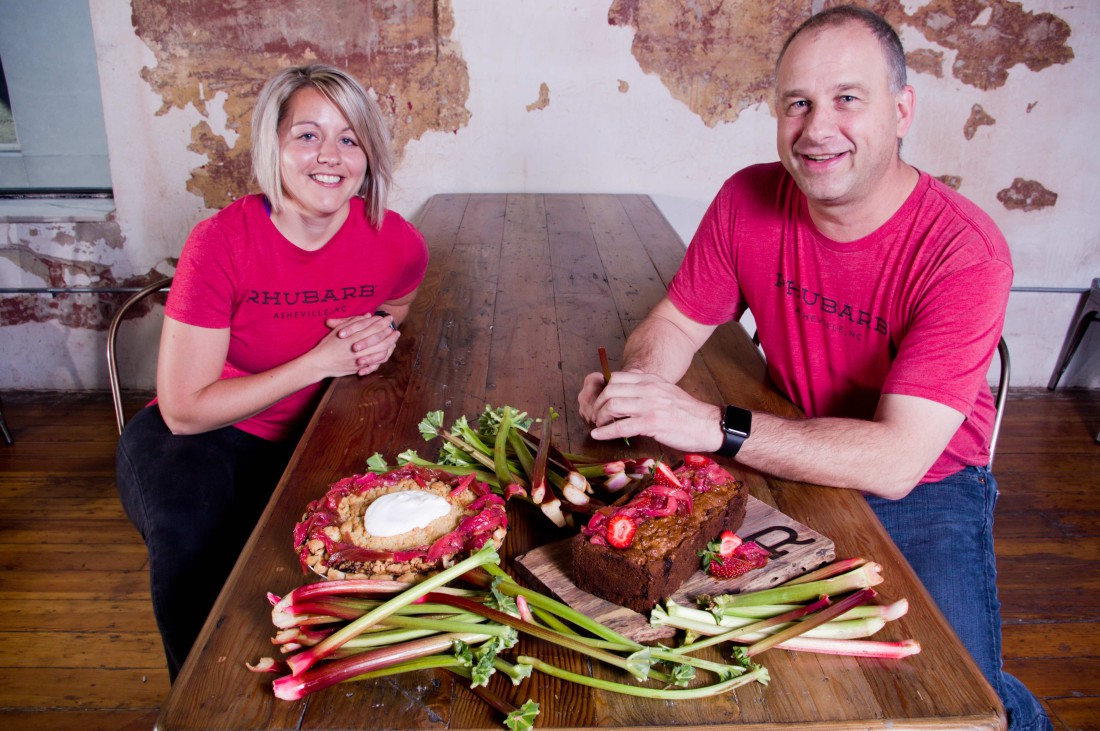Our farm came with a generations-old planting of rhubarb. Thick clumps of red-gold stalks with heart-shaped green leaves rimmed the inherited garden. Our neighbor Roy planted the perennial vegetables as a young man, and even though the land was under our cultivation, he still had a stake in making sure his rhubarb survived.
When the plants and Roy were both quite advanced in age, he advised us to dig up the roots and separate them. He could tell they were becoming too densely tangled and wanted to make sure his rhubarb stayed healthy.
Sadly, Roy is no longer with us to share his wisdom, but his plants live on in our gardens, and we think of him often as we use the tart-flavored stalks to make strawberry rhubarb scones or rhubarb ginger mostarda. Apparently, I am not the only one who possesses rhubarb passed down through generations. Since the plants come back year after year, many folks have rhubarb history to share.
Chris Inman, general manager for Sunburst Trout Farm, grows rhubarb on family land that he describes as a hobby farm in the Lake Logan area. He and his brother keep a garden with about 38 plants, some of which were originally grown by his great-great-grandfather. “Some of the roots are over 100 years old,” says Inman. “My great-grandfather got them from his father’s farm and brought them here.”
Familial knowledge and insight often get passed down the lines along with rhubarb roots. Inman says this year will likely yield a prolific harvest. “We had a deeper freeze this winter, and the roots need to go into deep freeze to regenerate,” he explains. “I haven’t researched that; it’s just what my grandfather told me.”
Inman begins to harvest in late April and weekly sends 30-40 pounds of rhubarb stalks to the namesake Asheville restaurant, Rhubarb, until October. “They get everything we grow,” he says. It makes sense that a restaurant with the same name uses copious amounts of the perennial plant.
I could not resist reaching out to John Fleer, chef and owner of restaurant Rhubarb and bakery The Rhu, to ask what motivated him to name his establishments after this vegetable. “It’s a metaphor,” Fleer explains. “It has a long-lasting root system and produces in cycles yearly. Rhubarb was historically used as a tonic to make health-promoting concoctions, and it has some ambiguity — parts of it are edible and parts are poisonous. It’s a little edgy.” Fleer makes the connection, saying, “These are all things that are indicative of our approach to food.”
Fleer and pastry chef at The Rhu, Kaley Laird, use the edible stalks and not the toxic leaves of the rhubarb plant to make their delicious concoctions. Pastries, sauces, fillings, pickles and preserves are on their menus many months of the year.
Other local chefs, who do not have sources quite as prolific as Inman’s farm, must be satisfied with a shorter season of rhubarb availability. Graham House, executive chef at Sovereign Remedies, gets his rhubarb from farmers at area tailgate markets throughout the spring and early summer.
House likes the tart flavor of rhubarb and highlights it in his dishes. “A lot of people are off-put by its tart flavor and like to add a lot of sugar to balance it. I look at a vegetable as its own entity and, instead of changing the flavor profile, I like to use it to accent dishes that are maybe a little heavy like foie gras,” he says, describing a pickled rhubarb glaze served over foie gras with shaved raw rhubarb on top.
On the other end of the spectrum, Megan Brown and Chris Allen, owners of Waynesville Soda Jerks, make the most of a traditional combination to produce their sweet-tart Strawberry Rhubarb Soda. They grind and cold-press rhubarb stalks, and combine the resulting juice with strawberry syrup before adding carbonation to make one of their most popular flavors.
Sourcing rhubarb from Stoney Hollow Farm and Ten Acre Garden, Brown explains, “All of our flavors, including Strawberry Rhubarb, start with the local farmers.” Brown sees rhubarb not just in past generations but in those of the future. “Our primary mission is to highlight and strengthen the local agricultural economy as the backbone it has historically been and will ideally be for future generations.”
It’s comforting to know old rhubarb roots of past generations continue to proliferate on today’s farms. Consuming locally sourced rhubarb in the form of soda, salsa or strawberry rhubarb bread provides a delicious way to strengthen the local economy and ensure the roots have a future in generations to come.




Before you comment
The comments section is here to provide a platform for civil dialogue on the issues we face together as a local community. Xpress is committed to offering this platform for all voices, but when the tone of the discussion gets nasty or strays off topic, we believe many people choose not to participate. Xpress editors are determined to moderate comments to ensure a constructive interchange is maintained. All comments judged not to be in keeping with the spirit of civil discourse will be removed and repeat violators will be banned. See here for our terms of service. Thank you for being part of this effort to promote respectful discussion.